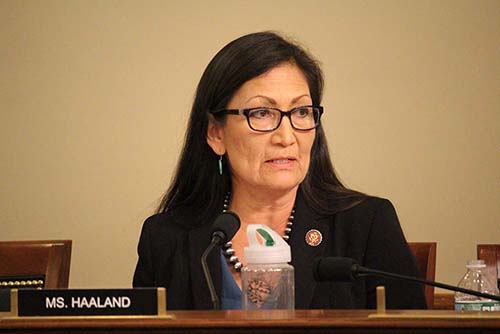Five Minnesota tribes in Rep. Pete Stauber’s (R-Minn.) congressional district criticized their leader for not representing Native interests in his effort to derail Rep. Deb Haaland’s nomination for Interior Secretary.

President-elect Joe Biden nominated Haaland (Pueblo of Laguna), a congressional representative from New Mexico (D-N.M.), on Dec. 17. If confirmed, she will be the first-ever Native American Cabinet member. She will also help drive Biden’s promise to transition America away from fossil fuels and reinstate protections on public lands.
Stauber circulated a draft letter urging other lawmakers to join him in his request to the incoming Biden administration to withdraw Haaland’s nomination. In the draft letter, which has not been made public, but was obtained by NBC News, the lawmaker wrote that “Nominating Representative Haaland is a direct threat to working men and women and a rejection of responsible development of America’s natural resources.”
Specifically, the Congressman outlined legislation Haaland co-sponsored banning mining in a 234,000-acre stretch of Superior National Forest. Included in that area is Stauber’s district, where the Twin Metals mining company is seeking to mine for copper.
In response to the news tribal leaders from Mille Lacs Band of Ojibwe, Bois Forte Band of Chippewa, Grand Portage Band of Lake Superior Chippewa, Fond du Lac Band of Lake Superior Chippewa, and Leech Lake Band of Ojibwe signed on to a letter to Stauber dated Jan. 14.
According to NBC News, the letter read: “This historic nomination is more important to us and all of Indian Country than any other Cabinet nomination in recent history. Your opposition to the first and only American Indian ever nominated to a Cabinet position is likely to reverberate across Indian Country.”
Additionally, the chair of the Midwest Alliance of Sovereign Tribes, a group that represents 35 tribal nations in the region, lambasted Stauber in a letter for not first consulting with the tribes in his district.
“We are unaccustomed to any member of Congress serving in such a public role in leading an attack that diametrically opposes the wishes of nearly all of Indian Country,” chair Aaron Payment wrote.
Stauber’s communications director, Kelsey Mix, told Native News Online that Congressman Stauber cannot support Haaland’s nomination because “the nominees’ support for extreme policies is not what hardworking families across northeast Minnesota need.”
More Stories Like This
Native News Weekly (August 25, 2024): D.C. BriefsUS Presidents in Their Own Words Concerning American Indians
Native News Weekly (February 15, 2026): D.C. Briefs
DHS Secretary Noem Tells Tribes ICE Does Not Target Native Americans
Native News Online Marks 15 Years of Warrior Journalism
Help us defend tribal sovereignty.
At Native News Online, our mission is rooted in telling the stories that strengthen sovereignty and uplift Indigenous voices — not just at year’s end, but every single day.
Because of your generosity last year, we were able to keep our reporters on the ground in tribal communities, at national gatherings and in the halls of Congress — covering the issues that matter most to Indian Country: sovereignty, culture, education, health and economic opportunity.
That support sustained us through a tough year in 2025. Now, as we look to the year ahead, we need your help right now to ensure warrior journalism remains strong — reporting that defends tribal sovereignty, amplifies Native truth, and holds power accountable.
 The stakes couldn't be higher. Your support keeps Native voices heard, Native stories told and Native sovereignty defended.
The stakes couldn't be higher. Your support keeps Native voices heard, Native stories told and Native sovereignty defended.
Stand with Warrior Journalism today.
Levi Rickert (Potawatomi), Editor & Publisher

